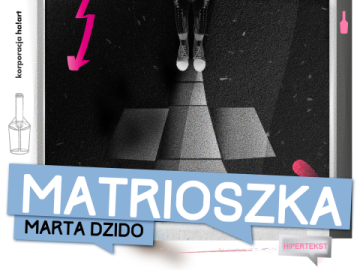Matrioszka

| Tytuł: | Matrioszka |
| Autor: | Marta Dzido |
| Seria: | Poza seriami |
| Data premiery: | 2013-10-03 |
Trzy kobiety, dwie historie, jedna krew. W arcypolskim dramacie zepsutych przez alkohol pokoleń spotykają się matka i córka, która wkrótce także zostaje matką, by jej córka gotowa była powtórzyć ten sam scenariusz… Rosyjska matrioszka, zestaw drewnianych lalek, włożonych jedna w drugą, to najlepsza alegoria tej kolistej opowieści, a przeploty i pętle hipertekstu to świetnie w nią wpasowana formuła narracyjna. Rezultatem jest dojrzała, mistrzowska proza, egzystencjalna wstęga Moebiusa, która prawdę życiową zderza z finezją formalną, włączając też w powieściowy dyskurs cyfrowe techniki manipulacji słowem i fabułą.
Matrioszka to dwie zazębiające się w egzystencjalnym błędnym kole opowieści: matki i córki, gdzie generacyjne różnice zatarte są przez powtarzający się problem alkoholizmu w polskiej rodzinie. Historia matki to także historia córki, a ta ostatnia powtarza błędy tej pierwszej. Tytułowa matrioszka, drewnianej lalki, w której wnętrzu znajduje się kolejna drewniana lalka, jest dobitną alegorią fabularnej kompozycji.
Przeploty, nawroty i powtórzenia to podstawowe chwyty retoryczne prozy hipertekstowej, złożonej z połączonych w sieć, rozproszonych elementów. Stąd atrakcyjność tej formuły dla tekstu Marty Dzido, którego zapętloną linearność, kolistość i cykliczną właśnie hipertekst jest w stanie oddać najlepiej.
Jako zbiór olinkowanych stron internetowych, w których pewne słowa przenoszą czytelnika z jednego fragmentu do innego, Matrioszka jest przejrzystą i przyjazną dla czytelnika całością. Dwie główne historie można czytać osobno i linearnie, wówczas odbiorca uruchamia tylko linki „przeźroczyste” (czarne strzałki), odpowiedniki przekartkowywania stron w książce. Poprzez dwa rodzaje specjalnych łączy – zielonych (które wyznaczają trawersowanie pojedynczej opowieści) i czerwonych (które wyznaczają przeskok z opowieści matko do historii córki), czytelnik zaproszony zostaje do eksploracji utkanej przez autorkę sieci tekstu.
• • •
HIPERTEKST MATRIOSZKA DOSTĘPNY ZA DARMO NA STRONIE: http://ha.art.pl/matrioszka/start.html
• • •
Marta Dzido (1981) – pisarka, reżyserka, montażystka. Autorka powieści Ślad po mamie, i Małż. Tłumaczona na wietnamski, węgierski i niemiecki. Stypendystka programów: Homines Urbani, Młoda Polska, Wyszehradzkich Rezydencji Literackich oraz Ministra Kultury. Absolwentka PWSFTviT w Łodzi. Autorka zdjęć do filmu dokumentalnego Podziemne państwo kobiet. Za swój reżyserski debiut filmowy, Downtown – miasto Downów, otrzymała nagrodę Hollywood Eagle Documentary Award i specjalną nagrodę Polskiego Instytutu Sztuki Filmowej. Obecnie pracuje nad filmem dokumentalnym Solidarność według kobiet. Mama 13-letniej Weroniki.
• • •
Premiera na festiwalu Ha!wangarda 2013
• • •
Three women, two stories, one bloodline. In a drama that is Polish to the bone, a tale of generations corrupt by alcohol, mother and daughter meet. The daughter soon also becomes a mother, her daughter in turn ready to repeat the same scheme… A Russian matryoshka, a set of wooden dolls, one in the other, is the best allegory for this circular story. The interlacing and looping hypertext in turn, is a perfectly fitted narrative formula. The result – a mature, masterly prose, an existential Moebius strip, that clashes life truth with formal finesse, incorporating into the novel’s discourse digital techniques of word and narrative manipulation.
Matrioszka are two stories, meshing in the existential vicious circle: a mother’s and a daughter’s story, where the generation differences are blurred by the recurring problem of alcoholism in the Polish family. The mother’s story is also the daughter’s, and the latter repeats the former’s mistakes. The title matryoshka, a wooden doll with another wooden doll inside, is a telling allegory of the narrative composition.
Interlaces, returns and repetitions are basic rhetorical tricks of hypertext prose, composed of scattered, but interconnected elements. No wonder the form was so attractive for Marta Dzido’s text, whose looping linearity, circularity and cyclicality is best reflected in a hypertext.
A collection of linked websites, where certain words carry the reader from one fragment to the other, Matrioszka is a clear and leader-friendly whole. The two main stories can be read separately and linearly – by launching only the “transparent” links (black arrows), equivalents of page-turning in a book. By using two kinds of special links – green (marking a traverse within a single story) and red (marking a jump from the mother’s to the daughter’s story), the reader is invited to explore the text web woven by the author.
• • •
Marta Dzido (1981) – writer, director, and film editor. The author of the novels Ślad po mamie and Małż. Her works were translated into Vietnamese, Hungarian and German. She was awarded a number of scholarships, including the Homines Urbani scholarship, the Młoda Polska scholarship, Visegard Literary Residency and a scholarship from the Polish Ministry of Culture. She graduated from the Łódź Film School. She is the author of the documentary Podziemne państwo kobiet (The Underground Women’s State) about abortion in Poland. Her director debut, Downtown – miasto Downów (Downtown – The Town of the Downs) won the Hollywood Eagle Documentary Award and the Polish Film Institute Award. Currently, she is working on a documentary entitled Solidarność według kobiet (Solidarity According to Women). She is the mother of Weronika (13 years old).
• • •
Dofinansowano ze środków Ministra Kultury i Dziedzictwa Narodowego






